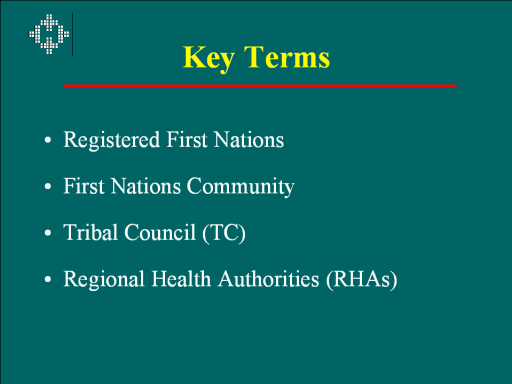| front |1 |2 |3 |4 |5 |6 |7 |8 |9 |10 |11 |12 |13 |14 |15 |16 |17 |18 |19 |review |
 |
Registered First Nations (RFN) - came into common usage in the 1970s to replace the word "Indian." Refers specifically to Aboriginal (or First Nations) persons who are registered (Status or Treaty) with the government. They receive entitlements of land, voting rights, and Band membership.
First Nations (FN) communities - separate tracts of land often called “reserves,” set aside specifically for the use of First Nations people, differentiated from other provincial boundaries under legal terms and treaties.
Tribal Council (TC) - "a grouping of bands with common interests who voluntarily join together to provide advisory and/or program services to member bands” (Indian and Northern Affairs Canada).
•
In Manitoba, there are seven Tribal Councils, plus two groupings that
combine all Independent or Unaffiliated First Nations communities in the
North and the South regions of Manitoba.
Regional Health Authorities (RHAs) - “autonomous health care organizations with responsibility for health administration within a defined geographic region within a province or territory. They have appointed or elected boards of governance and are responsible for funding and delivering community and institutional health services within their regions.” (CCARH)
•
At the time of the study, there were 12 RHAs in Manitoba, serving rural
and northern areas, as well as Winnipeg.
|